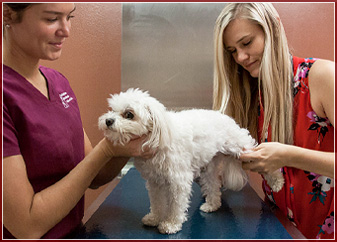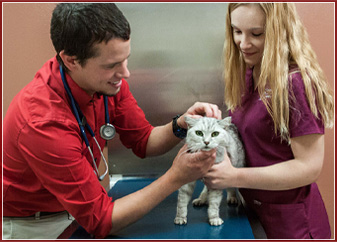Pet Wellness Services
Each day the employees at Hillside Animal Hospital come to work with the goal of providing superior service to our clients and compassionate care to their pets. To that end, we utilize advanced diagnostic tools, maintain a modern surgical suite, offer emergency coverage 365 days per year, electronic medical records, and endeavor to stay on the leading edge of veterinary care.
We also believe that having the best tools alone is not enough. Our doctors are highly experienced medical professionals with a wide range of expertise and training in surgical, diagnostic and wellness care procedures. We also believe that these doctors must be supported by the very best, which means that all of our veterinary technicians are board certified.
Hillside Animal Hospital also believes that our clients are our friends and that we all share the same love for our pets. This is why the focus of our care is on preventative medicine. As medical professionals, we know that the best means to keep your pet happy and healthy, as well as to minimize the lifetime cost of care, is through preventing illness. This is why we recommend routine wellness exams, appropriate vaccines, microchip lost pet ID, behavioral and nutritional counseling, specialized exams for pets in their senior years, and more.
 We are honored that our clients entrust us with the care of their pets and feel that it is our obligation to be there for them when they have a problem, not just when it is convenient during normal office hours. We offer extended appointment hours and have set our hours to provide convenient appointments for busy families. We also offer drop off appointments as well as schedule appointments from 7 am to 8 pm Monday through Friday and 8 am to 2 pm on Saturdays. We are available to our clients more hours than any other practice in the metropolitan area.
We are honored that our clients entrust us with the care of their pets and feel that it is our obligation to be there for them when they have a problem, not just when it is convenient during normal office hours. We offer extended appointment hours and have set our hours to provide convenient appointments for busy families. We also offer drop off appointments as well as schedule appointments from 7 am to 8 pm Monday through Friday and 8 am to 2 pm on Saturdays. We are available to our clients more hours than any other practice in the metropolitan area.
Please take a look at the services we offer and learn why we believe they are important to the health of your pet. If you have any questions please give us a call at (608) 788-3425.
Please Click On the Video Above to Begin Playback
Your Pet's Wellness Exam
 You go to the doctor regularly, but has your pet had a recent exam?
You go to the doctor regularly, but has your pet had a recent exam?
Because our pets can’t tell us how they feel, a regular physical examination is a very important piece of your pet’s health care. We recommend a complete nose-to-tail physical examination at least once a year, though more frequent exams are encouraged.
A routine examination provides you and your veterinarian with the opportunity to develop a picture of your pet’s overall health as well as to spot potential medical issues before they become serious health concerns. It’s also an opportunity for you to ask any important questions you may have about your pet’s health, habits and daily care. We also use this time to inform you about home healthcare for your pet and offer important advice and new information on the care of your particular type and breed of animal.
During your pet’s wellness checkup, Hillside Animal Hospital doctors will individualize our recommendations to the age, health and lifestyle of the pet as well as the concerns of our client. We will also perform a nose to tail exam that includes the following:
Listen to your pet’s heart – Early signs of cardiac disease such as heart murmurs and abnormal heart beat patterns known as arrhythmias can be heard through a stethoscope. Discovering these initial indicators of trouble ahead can lead to identifying and treating the underlying condition before it becomes a more serious health threat.
Listen to your pet’s lungs – Health issues such as infections, obstructive diseases and other problems can be detected by listening to your pet's lungs through a stethoscope. The doctor can also assess the overall pulmonary health of your pet.
Check your pet’s teeth and oral cavity – Examining your pet’s teeth and mouth is an important part of preventing dental disease, which is one of the most common health concerns in pets. Very young animals, such as kittens and puppies, also need to be checked to ensure they are developing an appropriate bite and that they are losing their baby teeth at the right time. We also take the time to discuss proper home dental care with you.
Evaluate your pet’s vision – All diseases follow relatively predictable processes and if found early can be more easily treated. Ocular conditions, which can also be prevented through regular care and screenings, are no exception.
Look into your pet’s ears – As with dental disease, ear disease is relatively common in many types of pets. Issues such as low-grade allergies, swimming or bathing, reactions to certain foods, mites and other parasites can all cause and contribute to otitis or ear disease. Though you may feel this is an area that can be well-handled at home, the fact is that many ear diseases are difficult to detect and require medical treatment.
Palpate the lymph nodes, abdomen and skin – By feeling the skin, we are looking for unusual lumps or swellings as well as evaluating for skin discolorations, lesions or patterns of hair loss or thinning. These can indicate the presence of more systemic problems, especially metabolic diseases, which most commonly occur in middle-aged animals.
Palpate joints and muscles – By examining the joints, legs and other areas of the body, we are able to evaluate for swollen joints, decreased muscle tone and variations in muscle size between the limbs. We also observe your pet's gait for developmental issues. In puppies, we look for early indications of hip or elbow problems. For older pets, we look for signs of arthritis, which can be well-treated if found early.
Lab work – A complete physical includes a heartworm test, parasite screening, and should include a full blood workup. Not only can a full chemistry panel and complete blood count identify the presence of underlying disease processes, but these tests help create a baseline should your pet become ill between routine examinations. Additionally, blood work is necessary if your veterinarian recommends a dental cleaning, removal of skin masses, or any other procedure that requires anesthesia.